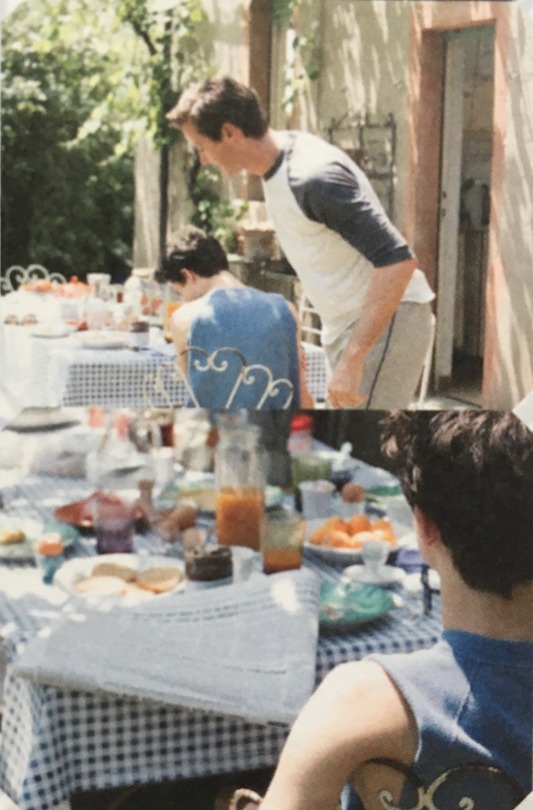via Gridllr.com — Find Your First Love!
via Gridllr.com — find your first love!
how i got a 29 the first time i took the act
i just wanted to give you guys some tips! not all of these work for everyone though so keep that in mind. also, i am going to take the test again in april for those interestedin knowing
to preface: i took the test while pretty sick and it was the morning after the opening night for a Christmas dinner i do each year, so i got maybe 6 hours of sleep. not the best conditions
my scores
composite score of 29
english score of 31
mathematics score of 26
reading score of 31
science score of 29
science, technology, engineering, and mathematics (STEM) score of 28
understanding complex texts of “above proficient”
progress toward career readiness of “progress toward gold level NCRC”
some general tips
choose a test center close to you. you will not want to wake up for the test. you will not want to drive there. it doesnt matter if youre unfamiliar with the place, people will be there to help you. but bring your own pencils and an eraser, they probably wont help you with those.
try to get as much sleep as possible. i didnt get much so to force myself awake i took a cold shower, but no caffeine because i feared crashing.
my breakfast that day was just some poptarts while i drove to the testing center, but i started to get hungry during the break. for the next test, im going to plan better and eat some cereal or toast.
take advantage of all leftover time. for me this meant going back to the questions i was super unsure of and making sure im satisfied with my answer choice as well as making sure all bubbles on my answer sheet were filled in enough. it also meant taking 5 minute naps where i drooled on the test booklet a little. oops?
use your break wisely. the testing center i was at had vending machines so i borrow a dollar from my friend and ate some m&m’s as a pick me up. i also put a bunch of cough drops in my jacket pocket. after i did this in the span of like 3 minutes i went back to my room and took a nap.
take advantage of the fact that everything is multiple choice (except the essay portion, obviously) because it reallycomes in handy.
i didnt really struggle with nerves because i went into the test with the mindset “i get what i get”. i had done what i felt was necessary to prepare and i knew this wouldnt be my last time. realistically, my act or sat score could be the thing that keeps me from entering my dream college (a school with a 7% admission rate and average act score of 34) but i am happy with my other choices of colleges. i have done all that i can do (which in this case was like.. 3 days of studying).
my biggest overall tip: know what the test will be like. know the order of the tests, the number of questions, and the time limits. this will leave no surprises. i was really glad i did this because i always knew what was coming.
tips for individual portions
english portion
75 multiple choice questions with four possible answers in 45 minutes.
dont read the entirety of the passage! read the first paragraph and the last paragraph before you read the questions then for each question skim for the info you need to properly answer the question. this allows you to spend more time with each question and to focus only on whats necessary.
brush up on word groups like there/their/they’re, it’s/its, and two/too/to. a lot of these questions are about following grammatical rules.
math portion
60 multiple choice questions with five possible answers in 60 minutes.
do what you know first. i almost ran out of time because i couldnt remember some things and spent too long on them so when i got to questions i knew at the end i was rushing and panicking and probably got some wrong.
if youre not sure how to do a problem, guess and check to the best of your abilities. guess and check works wonders.
reading portion
40 multiple choice questions with four possible answers in 35 minutes.
tbh i thought this was really similar to the english part so similar tips. but if the passage is on the short side, just read the whole thing.
science portion
40 multiple choice questions with four possible answers in 35 minutes.
real talk, i thought i bombed this portion like i walked out thinkin it was the reason id do so badly.
do NOT treat this like the english and reading portions! read the entirety of everything! redraw, rewrite, and rename things if you need to!
this part really focuses on graph interpretation and they will try to screw you over so hard with names of things. make sure you know how to interpret graphs well.
this was the only section where i rechecked every single answer. i was so used to the sat that i didnt know how to handle a science portion. it freaked me out.
essay portion
1 essay based on a promot in 40 minutes.
i didnt actually take this part because the only college on my list that says anything about it just recommends it and that school happens is my safety college. if youre really confident it will help your composite score, then take it. i chose not to mainly because im lazy and i didnt want to take the risk of it hurting my score even though i thought it could help since i write pretty strong essays, even under time constraints like id experience on the test.
some final tips
the act company sells a book. buy the book. its genuinely super helpful and im so glad i chose to buy it. i know some people use ones from outside sources, but i dont trust those as much. the official book is actually where i got a lot of my tips from.
take the test multiple times. i took the test in december because i knew i was unfamiliar with the formatting and wanted to have a basis for comparing my april score too. if i still am not happy with my april score, i plan on retaking it during the summer.
pay the extra $20 dollars to get your answers sent to you. it is quite literally the easiest and fastest way to see what you need to focus and improve on.
if you know youre taking the test, sign up as soon as possible. at the very least, sign up before youd have to pay the late fee.
dont add your picture until its like almost the last day. im the kind of person who changes uo my appearance often, specifically my hair color. if i uploaded a picture for the april date now, id be blonde in the picture even though ill probably have brown hair when i take the test.
a reminder
dont peace your self worth on this test. could it impact what college you go to? sure. but whether or not you did student council could too. im very proud of my score, but its not my end all be all. im more proud of the way i fold clothes or how organized my closet is than my act score.
good luck on all your tests everyone ❤️💕
More Posts from Areyoueventhere and Others
via Gridllr.com — gridlify your Likes!

Grunge baby
via Gridllr.com — take back control of your Likes!
They Put a Flag on the Moon

It’s 1969 and Apollo 11 astronauts Buzz Aldrin and Neil Armstrong are the first humans to land on the Moon. In now iconic footage, Aldrin and Armstrong carefully assemble and maneuver an American flag to place on the lunar surface. The fabric unfurls, staying suspended without any wind to animate the stars and stripes. The flagpole sways precariously as the crew work to anchor it in the Moon’s low gravity at just 1/6th that of Earth’s. How did this moment come about? On Flag Day, let’s dive behind-the-scenes of what led to getting the American flag on the Moon 50 years ago.

Image: Astronaut Buzz Aldrin poses for a photograph beside the deployed United States flag during the Apollo 11 mission.
Seeking to empower the nation, President John F. Kennedy gave us a grand charge. The human spaceflight program of the early 1960s was challenged to work on missions that sent humans to the surface of another world. Following President Kennedy’s death in 1963, President Richard Nixon stressed a more international perspective to the Apollo missions. To reconcile the need for global diplomacy with national interests, we appointed the Committee on Symbolic Activities for the First Lunar Landing.

Image: NASA Administrator Thomas Paine and President Richard Nixon are seen aboard the USS Hornet, Apollo 11’s splashdown recovery vessel.
The committee, and the U.S. at large, wanted to avoid violating the United Nations Outer Space Treaty, which prohibited any nation from taking possession of a celestial body. After some debate, they recommended that the flag only appear during the Apollo 11 spacewalk. A plaque would accompany it, explaining that the flag was meant to stand for peaceful exploration, not conquest.

Image: The plaque reads “Here men from the planet Earth first set foot upon the Moon July 1969 A.D. We came in peace for all of mankind.” Under the text are signatures by President Nixon, Buzz Aldrin, Neil Armstrong, and Michael Collins.
A team of engineers at Johnson Space Center had three months to resolve several issues regarding the flag’s assembly. First, was the Moon’s lack of atmosphere. The flag, quite literally, could not fly the way it does on Earth. To address this, a horizontal crossbar was added to support the flag’s weight and give the illusion of it waving.

Image: NASA technician David L. McCraw shows the flag next to a Lunar Module mockup.
Second was the flag’s assembly, which had to be as lightweight and compact as possible so as not to take up limited storage space. The completed package, which was attached to Lunar Module’s ladder, weighed just under ten pounds. It received an outer case made of steel, aluminum, and Thermoflex insulation and blanketing to shield the flag from the 2,000 degree Fahrenheit spike from the Eagle’s descent engine.

Image: Component pieces of the flag assembly.
The last issue was mobility. Bulky spacesuits significantly restricted the astronauts’ range of motion, and suit pressurization limited how much force they could apply. To accommodate these limits, the team included telescoping components to minimize the need to reach and maneuver the poles. A red painted ring on the flagpole indicated how far into the ground it should be driven. Hinges and catches would lock into place once the pieces were fully extended.

Image: Diagram from the 1969 Apollo 11 press release illustrating astronaut spacesuit reach capabilities and ideal working height.
Fifty years after Apollo 11, the flag we planted on the lunar surface has likely faded but its presence looms large in United States history as a symbol of American progress and innovation.

Image: A close-up view of the U.S. flag deployed on the Moon at the Taurus-by the crew of Apollo 17, the most recent lunar landing mission.
The story doesn’t stop here. Anne Platoff’s article “Where No Flag Has Gone Before” sheds more light on the context and technical process of putting the United States flag on the Moon. You can also check out Johnson Space Center’s recent feature story that details its presence in later missions. Happy Flag Day! Make sure to follow us on Tumblr for your regular dose of space: http://nasa.tumblr.com.




Details of Oscar Wilde’s tomb: Pére Lachaise Cemetery, Paris (France).
It was a tradition to Oscar’s admirers kiss his tomb in a demonstration of love and respect for his legacy. Unfortunately, the stains were causing some demage to the monument’s structure. However, you still can leave a kiss to Oscar Wilde: now, the tradition was adaptaded to kissing the glass that protect the beautiful tomb instead — the art is preserveted and Oscar is still getting love and kisses from people that came from all beautiful and peculiar places around the world.

Here are some of my favourite under-appreciated shots from the Japanese Booklet.
It’s so beautiful, guys! I love the format (it’s actually quite big).
Also, it seems the order of the shoot wasn’t as chronological as they made us believe, so I have even more appreciation for Timmy’s and Armie’s acting craft, seriously.
And Armie was on the set even when he wasn’t in the scene (Elio and Marzia friends forever scene on the piazza).
I absolutely love Amira:

Le Dancing:


Just a heads-up for all the armpit kinkers ( @shes-gone-rogue @shellgoes211 @holdmygazeoliver ):



I feel this one is not enough talked about, honestly:

via Gridllr.com — browse Likes to your heart's content!



“rework of a magazine page from the 2000s to fit today’s artists” by @wakeupzuzi on instagram









SpongeBob Moodboard v.2 baybeeeeee
The first one was kind of trash so shshshs
I don’t claim any of these photos!
-
 bradfordblitz liked this · 1 year ago
bradfordblitz liked this · 1 year ago -
 blackfemqueen12 liked this · 3 years ago
blackfemqueen12 liked this · 3 years ago -
 holaaaachicosss liked this · 3 years ago
holaaaachicosss liked this · 3 years ago -
 itsroxie liked this · 3 years ago
itsroxie liked this · 3 years ago -
 ashsoclassy liked this · 3 years ago
ashsoclassy liked this · 3 years ago -
 anadyomeni liked this · 3 years ago
anadyomeni liked this · 3 years ago -
 arebellioussoul reblogged this · 3 years ago
arebellioussoul reblogged this · 3 years ago -
 fromaseyewithlove liked this · 3 years ago
fromaseyewithlove liked this · 3 years ago -
 qu33nworlds reblogged this · 3 years ago
qu33nworlds reblogged this · 3 years ago -
 roseblossom48 reblogged this · 3 years ago
roseblossom48 reblogged this · 3 years ago -
 love-more122 liked this · 3 years ago
love-more122 liked this · 3 years ago -
 pinkalicousputa liked this · 3 years ago
pinkalicousputa liked this · 3 years ago -
 jamaicanblackcastoroil liked this · 3 years ago
jamaicanblackcastoroil liked this · 3 years ago -
 foxyfleurs liked this · 3 years ago
foxyfleurs liked this · 3 years ago -
 hunterroseeee liked this · 3 years ago
hunterroseeee liked this · 3 years ago -
 miramira24 liked this · 3 years ago
miramira24 liked this · 3 years ago -
 washablemarkersword liked this · 3 years ago
washablemarkersword liked this · 3 years ago -
 deemaissoontoit reblogged this · 4 years ago
deemaissoontoit reblogged this · 4 years ago -
 deemaissoontoit liked this · 4 years ago
deemaissoontoit liked this · 4 years ago -
 eyesfullofstarrs liked this · 4 years ago
eyesfullofstarrs liked this · 4 years ago -
 coldgiantbanditlawyer liked this · 4 years ago
coldgiantbanditlawyer liked this · 4 years ago -
 princesastudies reblogged this · 4 years ago
princesastudies reblogged this · 4 years ago -
 funfettified liked this · 4 years ago
funfettified liked this · 4 years ago -
 anthonywritessometimes liked this · 4 years ago
anthonywritessometimes liked this · 4 years ago -
 mariishat liked this · 4 years ago
mariishat liked this · 4 years ago -
 rodimoose liked this · 4 years ago
rodimoose liked this · 4 years ago -
 felicitybrood liked this · 4 years ago
felicitybrood liked this · 4 years ago -
 noisyblizzardruins liked this · 4 years ago
noisyblizzardruins liked this · 4 years ago -
 soularoha liked this · 4 years ago
soularoha liked this · 4 years ago -
 04meowie liked this · 4 years ago
04meowie liked this · 4 years ago -
 haruzumas reblogged this · 4 years ago
haruzumas reblogged this · 4 years ago -
 areyoueventhere reblogged this · 4 years ago
areyoueventhere reblogged this · 4 years ago -
 alura-g liked this · 4 years ago
alura-g liked this · 4 years ago -
 littleswanprinceisaduck liked this · 4 years ago
littleswanprinceisaduck liked this · 4 years ago -
 bluedrxgs liked this · 4 years ago
bluedrxgs liked this · 4 years ago -
 ricky-real liked this · 4 years ago
ricky-real liked this · 4 years ago -
 a-dyslexics-studyblr liked this · 4 years ago
a-dyslexics-studyblr liked this · 4 years ago -
 puddentang liked this · 4 years ago
puddentang liked this · 4 years ago -
 strugglebus-student liked this · 4 years ago
strugglebus-student liked this · 4 years ago -
 shirasagichiichan reblogged this · 4 years ago
shirasagichiichan reblogged this · 4 years ago



